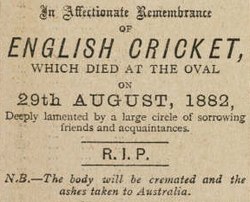Events
- 8 April (approx.): Formation of Warwickshire County Cricket Club at a meeting in Coventry.
- 10 May: Formation of Durham County Cricket Club.
- Somerset County Cricket Club played its initial first-class match v. Lancashire at Old Trafford on 8, 9 & 10 June and joined the County Championship, but for only four seasons initially.
- 14 August: C.T. Studd became the second player after W.G. Grace to accomplish the "double" of 1,000 runs and 100 wickets, which he achieved by dismissing Grace. [8]
- 28 & 29 August. England v. Australia at The Oval (only Test of the season). Australia won the most famous match in history by 7 runs with F R Spofforth, the original "Demon Bowler", taking seven for 46 and seven for 44. Soon afterwards, The Sporting Times printed its legendary obituary notice:

- In Affectionate Remembrance
- of
- ENGLISH CRICKET,
- which died at the Oval
- on
- 29th AUGUST, 1882,
- Deeply lamented by a large circle of sorrowing
- friends and acquaintances
- ----
- R.I.P.
- ----
- N.B.—The body will be cremated and the
- ashes taken to Australia.
- 25 September: Ted Peate breaks the late James Southerton’s 1870 record by taking his 211st wicket of the season. His record stands until Charles Turner takes his 215th wicket on 23 August 1888.
Further details can be found in the articles History of Test cricket (to 1883) and The Ashes.